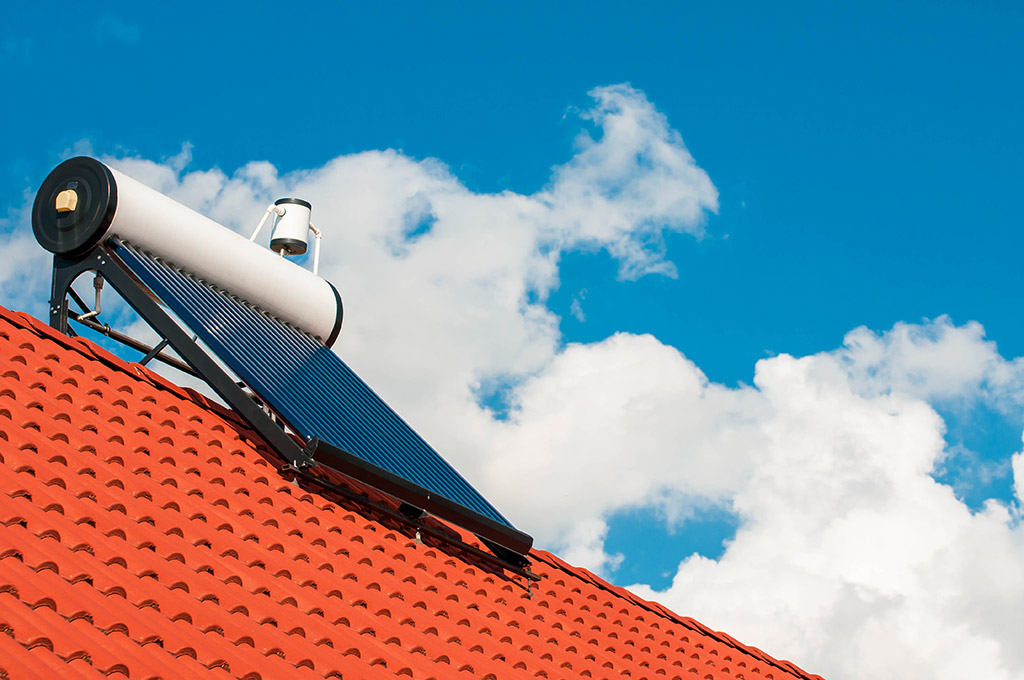A solar water heater on your roof captures the sun’s energy and heats the domestic water in your home. Easy to install, economical and ecological, the solar water heater is developing a lot in the world.

- How a solar water heater works
- Capturing solar energy
- Circulating solar energy from the collector to the storage tank
- Transfer heat to balloon water
- Keep hot water in the tank
- An efficient device
- Producing hot water is expensive!
- The sun is free!
- How to choose the right one?
In the following paragraphs, we will introduce you to the individual solar water heaters, how they work and their impact on your energy consumption. We will also take this opportunity to give you the various aids available for the installation of an individual solar water heater.
How a solar water heater works
Capturing solar energy
The first step of this water heater is to recover solar energy through a black solar collector placed on a roof. Indeed, an absorber made of a plate and black metal tubes intercepts the solar radiation and thanks to its black colour, it heats up (like a black car in the sun. A box surrounds and insulates the absorber and retains heat.
Circulating solar energy from the collector to the storage tank
The primary circuit transports heat. A fluid, usually water and antifreeze, flows through the sensor tubes, heats up and is sent to the storage tank.
Transfer heat to balloon water
A heat exchanger (coil) allows the fluid to transfer its calories to the water in the tank. The fluid circuit is closed, cooled, and it will heat up again in the solar collector. The energy used is indeed, renewable energy: that of the sun.
Keep hot water in the tank
As with a conventional hot water tank, the solar tank, well-insulated, stores hot water and empties and fills according to the needs of users.
An efficient device
Did you know that the production of domestic hot water consumes more energy than all your household appliances and lighting? Fortunately, technology is evolving, and today, solar water heating allows you to make substantial savings.
A solar water heater works with the energy recovered on your roof or in your garden by thermal solar panels which can be of different types (unglazed, glazed, vacuum or tubes). The ideal location for installing these panels is a south-facing roof with a slope of approximately 45° and completely unobstructed. For an individual house, we advise installing 4 to 6 m² thermal panels in a well-oriented way, which will capture the calories of the solar radiation and transmit them to a heat transfer fluid.
The latter is sent to the balloon to communicate in turn the calories it transports to the stored water before returning to the thermal panel. This closed-circuit system covers between 35% and 50% of the family’s needs depending on the local sunshine. When the sky is overcast, conventional energy (wood, gas, oil or electrical resistance) takes over from the solar panels to maintain the capacity for producing hot water and the well-being of the occupants of the home thus equipped.
Note: a solar water heater can also ensure the functioning of central heating. The water from the latter heated by the heat transfer liquid is conveyed to the radiators and then returns to the heat exchanger.
Producing hot water is expensive!
The production of hot water by a conventional electric tank represents 14% of your electricity bill. But who could do without the comfort of unlimited hot water? A general observation which should encourage the replacement of your conventional heater by greener and less greedy technology.
The sun is free!
The sun gives us free energy which we are beginning to know how to use efficiently. The surface of our planet receives, on average 350 W/m2 of solar power. Today’s solar panel technology allows us to generate electricity via photovoltaic panels or recover these calories via thermal panels. Completely free green and renewable energy!
How to choose the right one?
The geographical location of your home, the composition of your household and the space available within it will determine the choice of your solar water heater. The surface area of the solar collectors required to operate the system depends on the latitude of your region and the amount of hot water to be produced. The larger your family is, the bigger your ball will have to be. You will, therefore, need enough space in the boiler room or garage to install it.











